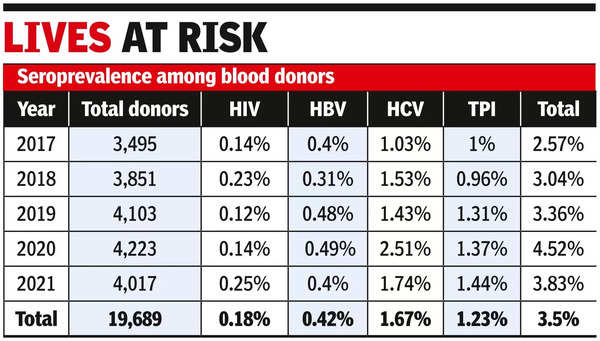[ad_1]
In a study conducted by a team of researchers from Adesh Institute of Medical Sciences and Research in Bathinda, out of 19,689 blood donations examined, 3.5% units tested positive for transfusion-transmissible infections, including human immunodeficiency virus (HIV), hepatitis B virus (HBV), hepatitis C virus (HCV), and Treponema pallidum infection.

To ensure safety, the World Health Organisation (WHO) emphasises that all blood donations must undergo testing for HIV, HBV, HCV, Treponema pallidum infection, and malaria.
The study aimed at ascertaining seroprevalence — the number of persons in a population who test positive for a specific disease based on serology specimens — of TTIs from January 1, 2017, to December 31, 2021, in donors at a blood centre.
For the study, a total of 19,689 samples collected in 5 years were examined, of which 690, which accounts for 3.5% of total units, were positive for transfusion-transmissible infections. Of the samples found positive, 1.67% donors were seropositive for HCV, 1.23% for Treponema pallidum infection, 0.42% for HBV, and 0.18% for HIV. With 191 samples tested positive out of 4,223 (4.52%), the prevalence of TTIs was found to be highest in the year 2020. In 2021, 3.83% samples were found infected with TTIs, 3.36% in 2019, 3.04% in 2018 and 2.57% in 2017.
Out of a total of 330 HCV cases detected in five years, 84.85% cases were found in voluntary donors and 15.73% in replacement donors, while rural donors accounted for 71.21% cases. The younger age group, 18-30 years, accounted for 61.82% HCV cases, with a maximum number of 103 (31.21% ) found in farmers, followed by 70 (21.21%) in labourers and construction workers.
Among 242 cases of Treponema pallidum infection, 84.29% were identified in voluntary blood donors. The HIV seroprevalence rate, the lowest among all transfusion-transmissible infections (TTIs), ranged from 0.12% in 2019 to 0.25% in 2021. Demographic analysis revealed that 70.24% cases occurred in rural donors. Occupational data showed the highest number of cases among farmers (34.29%), followed by labourers (21.90%). No cases of malaria were detected during this period.
The study, titled ‘Seroprevalence with epidemiological determinants of hepatitis C virus and Treponema pallidum infection in blood donors of a teaching hospital in southwest Punjab, India: A 5-year study’ was done by a team comprising Dr Nidhi Bansal, Dr Anshul Gupta, Dr Tanvir Sidhu, Dr Ram Niwas Maharishi, Dr Saurabh Gupta and Dr Arnav Roychoudhury. The findings have been published in the Journal of Family Medicine and Primary Care.
Experts have raised concerns regarding the elevated seroprevalence of HCV and Treponema pallidum infection, highlighting the urgent need for stringent donor selection criteria and intensified donor screening.
